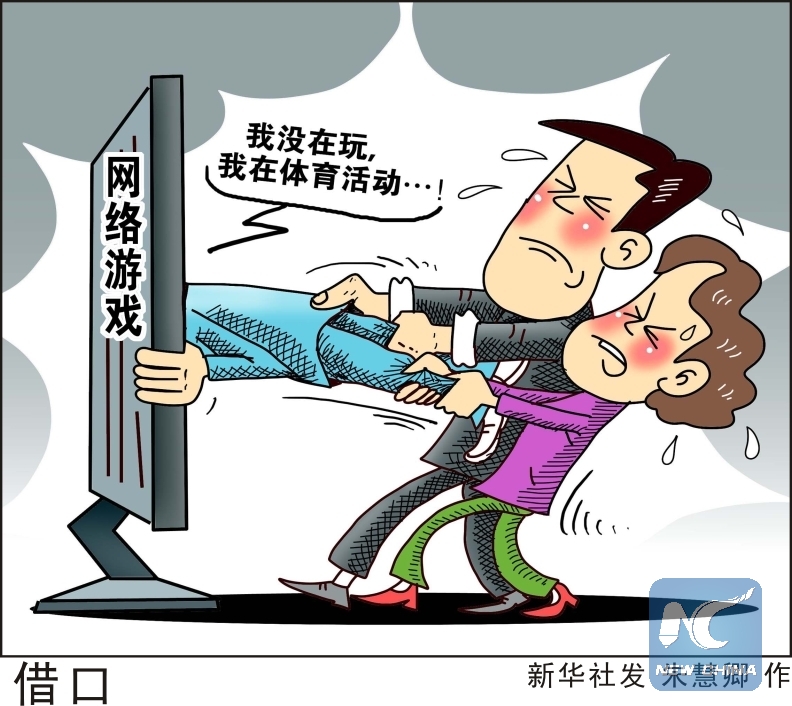
By Jing Xu
BEIJING, Jan. 29 (Xinhua) -- When you think of E-sports, you probably imagine a teenage boy with glasses, out of shape, with spots on his face sitting in front of a computer for hours, days, even weeks on end. You might think he neglects his duties at school, work, and to his family.
While this stereotype of the lazy gamer certainly has some truth to it, things are quickly changing as the world of E-sports becomes more professionalized. The competitive spirit that is creeping into electronic gaming is leading youngsters to view this activity as a potential career. Along with this development, E-sports enthusiasts are taking steps to shatter old notions about video games and those who enjoy them. Those who succeed as E-sports stars, many are saying, will have to be healthy in mind, body and spirit if they are to really go the distance.
The game Dota is one example of a game that has created a culture around itself which many are saying is providing real benefits to players.

Dota is a real-time strategy game that is played in teams. The gameplay is muti-layered and highly complex, meaning that it takes the best players years to master their craft.
The first set of benefits that the game is providing to those who play it are mental and emotional in nature. This particular game requires a great deal of teamwork. No one player can succeed alone, and teams that are cohesive and keep a positive attitude will have an advantage in the long run.
Proponents of E-sports say that they provide a useful way for young people to reduce stress in a manner that non-violent, constructive, and builds teamwork skills.
One Dota player surnamed Li plays for a team in Beijing. Although his companions are all full-time students and only play on an amateur level, they say that they hope to take things to the next level soon.
He says that the game is a much healthier way to decompress than some of the alternatives.
"Playing Dota can really help us unwind from the stress of university exams. Some people might think it's not a healthy habit, but I think it is a much better way to relax than binge drinking and smoking, like some of my classmates do," Li said.
"The only difficulty is making sure that we don't let it distract from our schoolwork. For some of the guys on my team, that is harder than it is for me. But we try to stay positive and keep each other motivated," he continued.

The game also requires serious manual dexterity, and this has to be sustained over a long period of time. This means that players who lead active lifestyles outside of competition will have an edge over those who are chronic couch potatoes.
Although sitting in front of a computer is not, in and off itself, a rigorous or healthy activity, teams and competition clubs are taking steps to make sure that players stay active during the course of gameplay. Professional matches often include stretch sessions and warm-up workouts to keep players moving in between rounds of play.
One challenge that many gamers say they face is opposition from their parents and authority figures, who struggle to see the potential for E-sports to provide a viable career path for youngsters.
"When I started thinking about gaming as a way to make my way in life, my parents were upset at first. But I think they are starting to see that, even if it is not the ideal career they had imagined for their son, it can give me a chance to motivate myself to achieve great things," said one gamer from Shaanxi province surnamed Han.
Han went on to say that his parents had agreed to support him on the condition that he promised to finish his studies and find a girlfriend. He reports that he is doing well in his classes at Beijing Normal University, and wants to be a computer programmer someday in addition to playing E-sports competitively.
"But I am still working on the second requirement, and I am not sure how that will go," Han said.
E-sports is really about much more than just wasting time in front of a computer. It allows young people an outlet to socialize and learn valuable skills like teamwork, patience, and persistence. It might also lead them into other, related fields in some of the most sought-after professions on the planet today like computer programming, engineering, game design, and mathematics. It also can provide much-needed self-esteem for kids who might not excel in traditional sports.
Social stigma and outdated attitudes are the only things holding E-sports back from becoming an avenue for young people to better themselves. Those hours spent in front of a computer can become an investment in the future if the right steps are taken to encourage it. (Jing Xu is a student from Canadian International School of Beijing)

